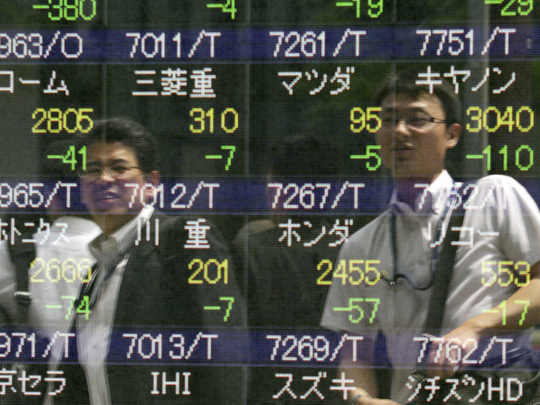
Singapore: Asian stocks fell, with the regional benchmark index heading for its first monthly decline since May, as investors await a speech by US Federal Reserve Chairman Ben S. Bernanke and as reports showed lower industrial output in South Korea and Japan amid slowing economic growth.
Sharp Corp sank 13 per cent as Taiwan’s Foxconn Technology Group founder Terry Gou ended a visit to Japan without announcing the conclusion of a deal to invest in the Japanese electronics maker. China Shipping Container Lines Co. slid 7 per cent after brokerages including Jefferies Group Inc downgraded ratings and price targets for the nation’s second- largest shipping company. Samsung Electronics Co. climbed 1.5 per cent, reversing losses, as a Tokyo court ruled the mobile- phone maker didn’t infringe Apple Inc’s patents.
The MSCI Asia Pacific Index slipped 0.6 per cent to 117.52 as of 3:13pm in Tokyo, heading for its lowest close since August 3. The gauge was poised for a 2.3 per cent decline last week, the most since the period ended July 13, extending this month’s losses to 1 per cent. Investors speculated Bernanke won’t announce further stimulus in his speech today at a meeting of central bankers in Wyoming.
“There’s been doubts about the US recovery momentum and heightened uncertainties in Europe and Asia,” said Ng Soo Nam, Singapore-based chief investment officer at Nikko Asset Management, which oversees about $165 billion. “If the bad numbers persist, we should see some policy support from governments.”
Japan’s Nikkei 225 Stock Average dropped 1.6 per cent. The nation’s industrial output unexpectedly fell last month, adding to signs that weak global demand is undermining the economy’s recovery. Falling consumer prices pointed to little progress in the fight against deflation.
South Korea’s Kospi Index slid 0.1 per cent. The country’s industrial production fell for a second month in July as Europe’s debt crisis crimped demand for exports.
Hong Kong’s Hang Seng Index fell 0.3 per cent. The city’s retail sales grew in July at the slowest pace since September 2009. China’s Shanghai Composite Index fell 0.2 per cent. Australia’s S&P/ASX 200 Index was little changed.
Futures on the Standard & Poor’s 500 Index were also little changed today. The gauge lost 0.8 per cent yesterday after a report showed more Americans than forecast filed applications for unemployment benefits last week, a sign the labour market is faltering amid a slowing economy.
Consumer spending in the US rose 0.4 per cent after being little changed in June, Commerce Department figures showed yesterday in Washington. That was less than the median estimate of economists for a 0.5 per cent gain.
“The US economy has stopped deteriorating, but it’s far away from having a strong rebound,” said Juichi Wako, a senior strategist at Tokyo-based Nomura Holdings Inc “Uncertainty is increasing in Europe, dragging down markets.”
Consumer stocks and raw material producers posted the biggest decline among the 10 industry groups in the MSCI Asia Pacific Index.
Exporters to the US and Europe fell. Toyota Motor Corp, the world’s biggest carmaker by market value, dropped 2.4 per cent to 3,095 yen in Tokyo. Honda Motor Co., which gets about half of sales from North America and Europe, decreased 2.4 per cent to 2,472 yen. Li & Fung Ltd, the world’s largest supplier of toys and clothes to retailers including Wal-Mart Stores Inc, slipped 2.2 per cent to HK$12.58 in Hong Kong.
Sharp, the maker of Aquos televisions, slumped 13 per cent to 198 yen as Foxconn founder Gou ended a visit to Japan without finalizing a deal to buy 9.9 per cent of the loss-making company. Foxconn Technology Co. dropped 1.7 per cent in Taipei.
China Shipping Container dropped 7 per cent to HK$1.46, extending losses for a sixth day, the longest streak since November. The company’s stock rating was cut to hold from buy and its share-price forecast halved by Jefferies after the shipper reported a wider first-half loss. BOCOM International Holdings Co. cuts its share-price forecast by 19 per cent to HK$1.72 and kept its neutral rating.
Nippon Steel Corp, which is merging with Sumitomo Metal Industries Ltd to create the world’s second-largest steelmaker, dropped 5.6 per cent to 151 yen. The companies widened their first-year loss estimates on a combined 240 billion yen ($3.1 billion) in impairment charges. Sumitomo Metal slid 5.1 per cent to 111 yen.
China Eastern Airlines Corp, the nation’s second-largest carrier by passengers, fell 2.1 per cent to HK$2.34 after saying first-half profit tumbled 65 per cent from a year earlier to 806.9 million yuan ($127 million) because of higher fuel costs and currency losses.
Of the 589 companies in the Asia-Pacific index that have reported quarterly earnings since July 1, and for which Bloomberg has estimates, more than half failed to meet projections, according to data compiled by Bloomberg.
Agile Property Holdings Ltd, a Chinese developer in which JPMorgan Chase & Co. owns a stake, dropped 4.5 per cent to HK$8.91 after its Chairman Chen Zhuo Lin was arrested by police in Hong Kong in connection with an allegation of indecent assault.
“The arrest put a bad name on the company,” said Sylvia Wong, a Hong Kong-based property analyst for UOB Kay Hian Ltd “We don’t think will affect the business operation.”
The MSCI Asia Pacific Index fell 8.3 per cent from this year’s high on February 29 through yesterday. Stocks on Asia’s benchmark index were valued at 12.4 times estimated earnings on average, compared with 13.6 for the S&P 500 and 11.5 for the Stoxx Europe 600 Index, according to data compiled by Bloomberg.
Among stocks that rose, Samsung Electronics, the world’s biggest mobile-phone maker by sales, gained 1.5 per cent to 1.233 million won, erasing earlier losses of 0.7 per cent. A Tokyo court ruled the South Korean company’s smartphones and a tablet computer didn’t infringe on an Apple invention for synchronizing music and video with servers.












